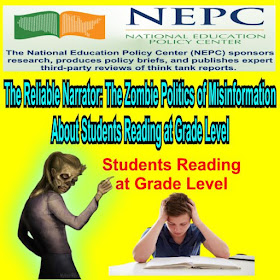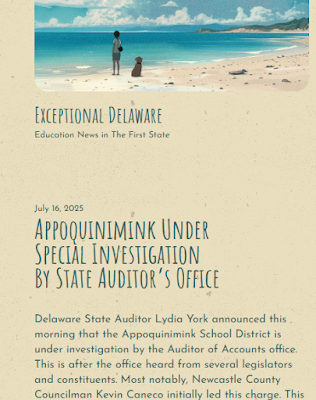Yesterday’s Gems, Today’s InsightsA Roundup of the Web’s Finest Blog Posts!
7-17-25
7-17-25
Supreme Court Okays Trump's Evisceration of US Department of Education https://open.substack.com/pub/dianebrooklyn/p/supreme-court-okays-trumps-evisceration?r=kja7f&utm_campaign=post&utm_medium=web&showWelcomeOnShare=false
### Key Points
- Supreme Court ruling allows Trump to dismantle the Department of Education without Congressional approval, raising concerns about constitutional checks and balances.
- Historical overview of Republican attitudes toward the Department of Education, highlighting shifts under Reagan, Bush, and Trump.
- Trump’s second term shows increased influence of far-right extremists, reshaping education policies and governance.
Johann Neem: Is the Supreme Court On Track to Outlaw Public Schools? https://dianeravitch.net/2025/07/16/johann-neem-is-the-supreme-cort-on-track-to-outlaw-public-schools/ via @dianeravitch
Johann Neem's essay explores the implications of the U.S. Supreme Court's decision in Mahmoud v. Taylor, which ruled that exposing students to ideas conflicting with their parents' religious beliefs violates the First Amendment. This decision could undermine public education by prioritizing parental religious freedoms over educational diversity and inclusivity. Justice Alito's majority opinion suggests that even exposure to ideas opposing religious beliefs is unconstitutional, leading to strict judicial scrutiny of curricula. Justice Sotomayor's dissent warns that this ruling could create chaos in public schools and potentially dismantle them, favoring private school voucher systems. Neem highlights the historical significance of public education and the potential loss of one of America's foundational institutions.
### Key Points
- The Supreme Court ruled in Mahmoud v. Taylor that exposing students to ideas conflicting with their parents' religious beliefs violates the First Amendment.
- The court's decision implies that public education may be unconstitutional, favoring private school voucher systems over common schools.
- Justice Alito argued that even exposure to ideas opposing religious beliefs burdens parental rights, invoking Wisconsin v. Yoder as precedent.
- Justice Sotomayor's dissent warns the decision could create chaos in public schools and predicts their dismantling.
- Neem emphasizes the historical importance of public education and the threat posed by the ruling to its existence.
Heather Cox Richardson: Everything You Need to Know About Immigration Law https://dianeravitch.net/2025/07/16/heather-cox-richardson-everything-you-need-to-know-about-immigration-law/ via @dianeravitch
Heather Cox Richardson’s article examines the history and current state of U.S. immigration policy, tracing its evolution from the 1924 Johnson-Reed Act to recent challenges under various administrations. It highlights the political weaponization of immigration, public opinion trends, and the impacts of legislation like the Hart-Celler Act and Title 42. The piece also critiques the Trump administration's approach, including its use of xenophobic rhetoric and policies, while contrasting it with Biden's efforts to reform immigration law amidst partisan resistance.
### Key Points
- U.S. immigration policy has evolved significantly since the 1924 Johnson-Reed Act, which imposed racial quotas favoring Western Europe while restricting immigration from Asia, Africa, and Southern Europe.
- The 1965 Hart-Celler Act replaced racial quotas with caps on total immigration but inadvertently shifted immigration patterns toward Asia and Latin America while limiting Mexican migration.
- Bipartisan attempts to address immigration issues, such as the 1986 amnesty program and the 2013 Senate reform measure, faced political roadblocks and exacerbated undocumented migration challenges.
- Trump’s administration weaponized immigration for political gain, embracing xenophobic rhetoric, implementing Title 42 to block asylum seekers, and opposing comprehensive reform.
- Biden proposed modernizing immigration processes, but efforts were stalled by MAGA Republicans demanding restrictive measures like Title 42.
- Public opinion largely supports immigration as beneficial, with polls showing Americans favor pathways to citizenship for undocumented immigrants and opposing mass deportations.
- Migrants are increasingly driven by economic instability and violence in their home countries, creating a refugee crisis rather than economic migration.
- Trump’s reelection campaign leveraged anti-immigrant sentiment, further polarizing immigration debates and enabling authoritarian policies.
Stephen Colbert and Father James Martin: Preserve Separation of Church and State https://dianeravitch.net/2025/07/16/stephen-colbert-and-father-james-martin-preserve-separation-of-church-and-state/ via @dianeravitch
Stephen Colbert and Father James Martin: Preserve Separation of Church and State By diane ravitch July 16, 2025 // 1 Stephen Colbert converses with Jesuit priest James Martin , SJ. You won’t want to miss this! Diane Ravitch's Blog### Key Points
- Diane Ravitch's blog highlights key political and social topics, including education, democracy, and healthcare reforms.
Dancing with the Devil https://open.substack.com/pub/ru4people/p/dancing-with-the-devil?r=kja7f&utm_campaign=post&utm_medium=web&showWelcomeOnShare=false
Dancing with the Devil: AI in the Classroom and the AFT’s Bold Collaboration
### Key Points
- The author shares a personal journey of using AI tools like Grammarly to overcome dyslexia and improve blog writing, highlighting both the transformative benefits and risks of relying on AI for research.
- AI’s role in education is both promising and perilous, with potential to streamline tasks while raising concerns about bias, misinformation, and privacy.
- The American Federation of Teachers (AFT) launched a $23 million National Academy for AI Instruction in collaboration with Microsoft, OpenAI, and Anthropic, aiming to train 1.8 million educators in ethical and effective AI use.
- Critics worry about corporate influence in education, fearing that AI integration may prioritize profits and workforce agendas over student needs and teacher autonomy.
- AI should be viewed as a tool rather than a replacement for teachers, emphasizing the importance of human connection, empathy, and ethics in classrooms.
- The AFT’s initiative seeks to empower teachers, but broader involvement and policies are needed to ensure AI development aligns with fairness, accountability, and student welfare.
Big Education Ape: WHY DONALD TRUMP IS RUNNING FROM THE GHOST OF JEFFREY EPSTEIN https://bigeducationape.blogspot.com/2025/07/why-donald-trump-is-running-from-ghost.html
The article explores various topics, including political intrigue surrounding Donald Trump and Jeffrey Epstein, public education challenges, and other societal issues.
### Key Points
- Donald Trump dismisses the Jeffrey Epstein inquiry as "boring," sparking backlash from MAGA supporters demanding transparency.
- MAGA supporters criticize Trump for perceived hypocrisy, claiming he avoids accountability for elites linked to Epstein's case.
- Prominent Republicans call for the release of Epstein files, but Trump resists, leading to internal divisions within his base.
- Trump frames the controversy as media bias and political witch-hunting, but Epstein's shadow continues to affect his legacy.
The Reliable Narrator: The Zombie Politics of Misinformation About Students Reading at Grade Level | National Education Policy Center https://nepc.colorado.edu/blog/zombie-politics
This article critiques persistent misconceptions about student reading proficiency in the U.S., particularly the claim that two-thirds of fourth graders are not reading at grade level. It highlights how media coverage often misrepresents data from the National Assessment of Educational Progress (NAEP) by misunderstanding its achievement levels. The blog post argues that "proficient" on NAEP is aspirational and above grade level, creating a false narrative of widespread failure. Additionally, it challenges the claim that 95% of students could achieve grade-level reading with proper instruction, stating this lacks empirical support. The author underscores how misinformation about reading proficiency perpetuates ineffective education reforms and disproportionately impacts marginalized populations.
### Key Points
- Media perpetuates misconceptions about U.S. student reading proficiency, particularly the two-thirds claim, due to misunderstanding NAEP achievement levels.
- NAEP "proficient" is aspirational and above grade level, creating a misleading narrative about student failure.
- The claim that 95% of students could achieve grade-level reading with proper instruction is overstated and unsupported by scientific evidence.
- Misrepresentation of reading data has historically fueled ineffective education reforms and disproportionately affected vulnerable student populations.
Teacher Tom: I Have a Philosophy? https://teachertomsblog.blogspot.com/2025/07/i-have-philosophy.html
Teacher Tom reflects on his journey as a preschool teacher, blogger, and advocate for play-based learning. Starting his blog in 2009 with modest ambitions, it evolved into a platform for sharing stories and connecting with educators globally. He emphasizes the importance of child-led, play-based education, which fosters critical thinking, collaboration, and a love for learning. Over time, his philosophy gained traction, inspiring educators and parents worldwide. Teacher Tom now offers a Play-Based Learning Summer Camp to help others adopt his approach, emphasizing authentic childhood experiences centered on play.
### Key Points
- Teacher Tom started his blog in 2009 to preserve articles he wrote and later used it to share stories inspired by children’s play.
- He connected with educators globally who shared his belief in play-based learning, forming a supportive informal network.
- His philosophy advocates for child-led learning through play, fostering motivation, collaboration, and critical thinking.
- A turning point was his 2013 speaking event in Greece, which demonstrated growing interest in his ideas.
- Teacher Tom offers a Play-Based Learning Summer Camp to share his philosophy and help others develop their own approaches.
- He has shared his philosophy through thousands of blog posts, books, and talks, focusing on the importance of play in childhood.
- The camp is designed for educators, parents, and caregivers to embrace play-centered learning and start the school year united in approach.
Appoquinimink Under Special Investigation By State Auditor's Office https://exceptionaldelaware.wordpress.com/2025/07/16/appoquinimink-under-special-investigation-by-state-auditors-office/ via @ExcptlDelaware
### Key Points
- Delaware State Auditor Lydia York announced a special investigation into the Appoquinimink School District after concerns about a budget shortfall, initiated by lawmakers and constituents, including Councilman Kevin Caneco.
- The inquiry will focus on the budget shortfall for quick resolution, with cooperation expected from district leadership. Annual audits mandated by Delaware code will continue alongside this investigation.
- Since Fiscal Year 2021, the Auditor’s office has identified 124 findings across Delaware school districts, highlighting systemic issues in transparency, accountability, and fiscal controls.
- The Auditor’s office faces resource constraints, despite recent funding increases, which limits its ability to conduct more audits and special investigations efficiently.
- Over $5 million appears to be missing from the Appoquinimink budget, raising significant concerns, especially after the CFO’s departure during the revelation.
glen brown: What Are You Spraying on Your Lawn? https://teacherpoetmusicianglenbrown.blogspot.com/2025/07/what-are-you-spraying-on-your-lawn.html
The article discusses the increasing use of diquat, a herbicide ingredient replacing glyphosate in weedkiller products, and its alarming health risks. Despite being banned in multiple countries, diquat remains widely used in the US due to weak pesticide regulations and industry influence on the EPA. Research highlights its toxicity, including damage to organs, gut bacteria, and links to chronic diseases like Parkinson’s. Advocacy efforts for stricter regulations are hindered by ongoing battles over other toxic substances
### Key Points
- Diquat, a glyphosate replacement in weedkillers, is more toxic and banned in many countries but still widely used in the US.
- Research shows diquat damages organs, gut bacteria, and may cause chronic diseases like Parkinson’s.
- Weak US pesticide regulations and industry influence prevent stricter controls on diquat.
- Advocacy groups struggle to prioritize diquat amid ongoing battles over other harmful pesticides.
Unity Celebrates COPE And once again, poses the burning question, Is Marianne Pizzitola a right-wing extremist, OR a left wing extremist? https://open.substack.com/pub/arthurgoldstein/p/unity-celebrates-cope?r=kja7f&utm_campaign=post&utm_medium=web&showWelcomeOnShare=false
Upgrade to paid Unity Celebrates COPE examines the complexities of union politics, healthcare, and the role of COPE contributions within the UFT. The author critiques Unity leadership, highlights Marianne Pizzitola’s advocacy for retiree healthcare, and questions the integrity of union endorsements and decisions.
### Key Points
- COPE contributions are used by UFT to support political causes, but their impact on member interests is criticized.
- Unity leadership has faced backlash for healthcare decisions, including the shift to Medicare Advantage plans, which retirees oppose.
- Marianne Pizzitola is portrayed as a polarizing figure, championing retiree healthcare and challenging Unity’s narrative.
- Unity’s endorsement process is criticized for being restrictive and predetermined, raising trust issues among members.
- The author expresses distrust in Unity leadership and advocates for supporting groups like NYC Retirees fighting for better healthcare.
Obama: “Toughen Up,” Leaders – Cloaking Inequity https://cloakinginequity.com/2025/07/16/obama-toughen-up-leaders/
### Key Points
- Former President Obama urges leaders across sectors to "toughen up" and take responsibility in a challenging era, emphasizing the need for courage and action.
- Silence among leaders, especially in education, is equated to surrender, as political campaigns aim to suppress critical thinking and equity through censorship and control.
- Examples of avoidance strategies by leaders, like Dr. Santa Ono, highlight the failure to defend institutional values against political pressures.
- Bold leadership at institutions like Harvard and Princeton demonstrates the importance of integrity, legal resistance, and public advocacy in defending academic freedom and equity.
- Leadership hiring practices often prioritize neutrality and caretaking over courage and advocacy, which is a critical failure in the current political climate.
- Leaders must embrace public advocacy, legal resistance, and principled defense of values, shaping narratives rather than evading controversy. Courage should be a core qualification for leadership roles.
WATCH: Teachers vs. fascists Teachers union leader Randi Weingarten on why Trump fears educators, how the Democratic Party has to change, and why A.I. will transform learning itself https://the.ink/p/watch-teachers-vs-fascists?utm_source=substack&utm_content=feed%3Arecommended%3Acopy_link
Randi Weingarten, president of the American Federation of Teachers, discusses the challenges facing public education, democracy, and societal progress. Topics include the politicization of education, the Democratic Party's need for inclusivity, and the transformative impact of AI on learning. She also reflects on her resignation from the Democratic National Committee, the importance of engaging with concerned parents, and lessons from the gay rights movement. While many praise her advocacy, some critics accuse her of aligning with tech billionaires and undermining public education.
### Key Points
- Randi Weingarten explains why education is targeted by the right and highlights the fears fascists have regarding teachers.
- She emphasizes the need for the Democratic Party to expand its tent and address parental concerns about social change.
- Weingarten discusses the future of education in the context of AI and addictive technologies.
- Her interview sparked positive reactions about her insights and leadership, though some criticized her alleged ties to tech billionaires and their influence on public education.
- Critics argue that her support of AI and partnerships with corporations may harm the teaching profession and public schools.
Volunteer Opportunities, Events, and Petitions Near Me · AFT on Mobilize https://www.mobilize.us/aft/?org_ids=7229
Yesterday’s Gems, Today’s InsightsA Roundup of the Web’s Finest Blog Posts!7-16-25
The article covers a variety of topics, including political decisions impacting public education, immigration policies, the integration of AI in classrooms, grassroots movements combating authoritarianism, and the challenges faced by educators and public schools. It highlights systemic issues such as privatization, censorship, societal inequality, and the erosion of democracy, while emphasizing the importance of collective action, ethical education practices, and defending vulnerable communities.
### Key Points
- The Supreme Court ruled 6-3 in favor of Trump continuing layoffs at the Department of Education, bypassing Congressional authority, raising concerns about executive overreach and far-right extremism.
- Trump administration proposed banning undocumented immigrant children from Head Start, affecting low-income preschoolers and other HHS programs, sparking lawsuits and public outrage.
- Zoltan Mamdani's progressive campaign in NYC focuses on affordability, but controversy over his racial identification on college applications has divided Democrats and fueled criticism from right-wing media.
- AI tools like ChatGPT are cautiously integrated into classrooms, raising ethical concerns about equity, data privacy, and corporate influence. Critics worry about over-reliance and misinformation.
- Teacher unions partnering with tech companies like OpenAI and Microsoft for AI training raises concerns about corporate agendas overshadowing public education priorities.
- Harold Washington's political rise in Chicago is compared to Zohran Mamdani's NYC campaign, both emphasizing grassroots organizing and systemic change amidst establishment opposition.
- Trump’s strategies to dismantle the Department of Education align with authoritarian tactics, including privatization, censorship, and scapegoating vulnerable communities.
- Anti-immigrant policies and aggressive deportation actions under Trump administration erode America’s narrative as a country valuing human dignity and liberty.
- Preschool teacher development varies across cultures, with Japan’s collaborative model being the most stable, while the U.S.’s self-directed approach faces external challenges.
- Privatization, censorship, and socio-economic inequality harm public education, with corporate influence and excessive testing overshadowing poverty as a key issue.
- MIT research highlights cognitive and behavioral concerns from students’ reliance on AI tools, advocating for careful integration and longitudinal studies.
- Seattle Public Schools faces delays in appointing a new superintendent, raising concerns about rushed decisions, nepotism, and community engagement during the transition.
- Trump froze $7 billion in education funding, impacting public schools and critical programs, while promoting federal voucher schemes benefiting private institutions.
- Grassroots movements like "One Million Rising" advocate for strategic non-cooperation and community organizing to combat authoritarianism and defend democracy.
- Declining vaccination rates, fueled by misinformation and political polarization, have caused a resurgence of measles in the U.S., threatening public health.
- School vouchers and privatization exacerbate inequality, benefiting wealthy families while underfunding public schools.






























































































